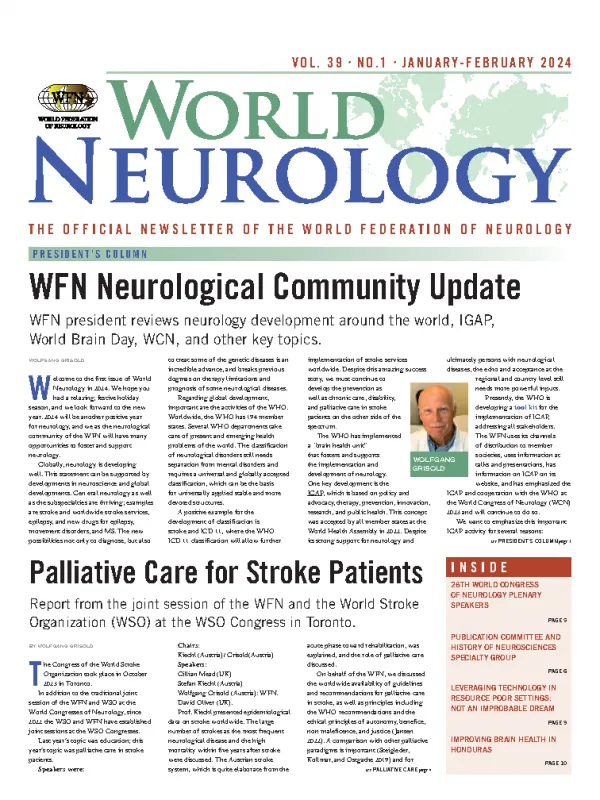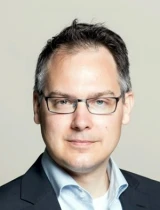
We'd like to welcome all readers to the February 2024 issue of World Neurology, the first issue of 2024. The issue begins with the President's Column. Dr. Wolfgang Grisold, WFN president, provides an overview of the many activities being planned, organized, and supported by the World Federation of Neurology (WFN) for 2024 and beyond. In this issue, you will also find a summary of the many outstanding plenary sessions presented during the World Congress of Neurology (WCN) 2023, with a foreward by Dr. Guy Rouleau, WFN vice president.
Dr. Chandrashekhar Meshram, WFN elected trustee, provides a summary of the WFN Publications Committee and History of Neurosciences Specialty Group. This issue's History column is devoted to a book titled The History of Stroke by Dr. Jan van Gijn. Dr. Jan Stam provides the book review.
Dr. Duc Nguyen, a neurology trainee from Vietnam, summarizes his remarkable experience as the first recipient of an WFN and Indian Academy of Neurology Asian Departmental Visit provided at the Postgraduate Institute of Medical Education & Research in Chandigarh, India. Dr. Prisca-Rolande Bassolé, a young neurologist from Dakar, Senagal, reviews her attendance at the WCN2023 supported by a WFN Junior Traveling Fellowship. Dr. Bindu and Medha Menon describe their foundation's activities aimed at using technology to mitigate the impact of epilepsy in their region of India.
Dr. Grisold provides a report of the Joint Session of the WFN and the World Stroke Organization (WSO) that occurred October 2023 at the WSO Congress in Toronto. The session was devoted to the concept of palliative care for stroke patients. Dr. Orla Hilton updates us on the Global Research Coalition and the call for collaboration in global research initiatives devoted to global brain heath.
Dr. Cassandra Kniffin Arnold and Joanna Amberger report on the Online Mendelian Inheritance in Man (OMIM) database, with a foreward to this important initiative by Dr. Martin Krenn. Dr. Marco Tulio Medina reports on the recent anniversary celebration of the creation of the Neurology Postgraduate Program at the Universidad Nacional Autónoma de Honduras (UNAH), which one of the World Neurology editors (SLL) had the privilege and honor of participating in.
Finally, Dr. Fabrizio Benedetti reviews the current pharmacological and toxicological concepts underlying the important phenomena of placebo/nocebo and the brain.
In this first issue of 2024, we want to thank all readers for their interest in the WFN and World Neurology. We look forward to sharing additional information with you about the WFN, neurology, and neurologists around the world in future issues of World Neurology. •


By Steven L. Lewis, MD, Editor, and Walter Struhal, MD, Co-Editor
Published by Ascend Integrated Media LLC, Kansas, USA
Highlights
President's Column
-
WFN Neurological Community Update ⧉
By Wolfgang GrisoldWFN president reviews neurology development around the world, IGAP, World Brain Day, WCN, and other key topics.
The WFN Committees and Specialty Groups
- Publication Committee and the History of Neurosciences Specialty Group ⧉
By Chandrashekhar MeshramReview of the history of the Neurosciences Specialty Group and reviews the function of the WFN Publications Committee.
From WFN
- Palliative Care for Stroke Patients ⧉
By Wolfgang GrisoldThe Congress of the World Stroke Organization took place in October 2023 in Toronto. In addition to the traditional joint session of the WFN and WSO at the World Congresses of Neurology, since 2022 the WSO and WFN have established joint sessions at the WSO Congresses. Last year's topic was education; this year's topic was palliative care in stroke patients.
- 26th World Congress of Neurology Plenary Speakers ⧉
Plenary speakers shared their latest research on topics such as diabetic neuropathies, Parkinson's disease, ALS, and global health care equity.
WFN Junior Travelling Fellowship 2023
- Report of My Attendance at the WCN2023 ⧉
By Prisca-Rolande BassoléI had the opportunity to refresh my knowledge and share work of my Neurosciences Department on epilepsy (e-Poster 402) and sleep disorders (e-Poster 400) with colleagues from other countries. I also had the privilege of following in the footsteps of the eminent Prof. Wilder Penfield, a pioneer in the "functional localization" of brain areas, during a historic discovery at the McGill Neuro Hospital of Montreal.
Department Visit
- My Experience in the Asian WFN Department Visit Programs ⧉
2023 was a special year for me, a Vietnamese neurology resident, as I was honored to join the first Asian Department Visit Program by the World Federation of Neurology (WFN) and the Indian Academy of Neurology (IAN). This program allows young neurologists from low- to middle-income Asian countries to visit the Postgraduate Institute of Medical Education & Research (PGIMER), Chandigarh, India, and learn from its neurology department. Thanks to the arrangement of WFN and IAN, I achieved all the objectives of the program and more.
Around the World
- Leveraging Technology in Resource Poor Settings: Not an Improbable Dream ⧉
By Bindu Menon and Medha MenonIdentifying problem statements, technology can help provide simple solutions that go a long way in bridging lapses in treatment.
- Improving Brain Health in Honduras ⧉
By Marco Tulio Medina, FAAN, FEANCommunity education programs and the creation of the Neurology Postgraduate Program at the Universidad Nacional Autónoma de Honduras.
- The Global Neuro Research Coalition: A Call for Collaboration ⧉
By Orla HiltonJoin the collective network of neurologists, neuroscientists, and allied specialty professionals to create a research environment that tackled problems of global neurology.
- The Online Mendelian Inheritance in Man (OMIM) Database ⧉
By Cassandra Kniffin Arnold and Joanna AmbergerIn 1863, Nikolaus Friedreich described a juvenile-onset form of hereditary ataxia (Friedreich ataxia). Several years later, George Huntington described an adult-onset hereditary chorea (Huntington disease). Nearly 100 years later, these familial genetic neurologic disorders, along with over 1,400 other genetic disorders, were included in Dr. Victor McKusick's seminal textbook Mendelian Inheritance in Man: Catalogs of Autosomal Dominant, Autosomal Recessive, and X-linked Phenotypes (MIM).
- Placebo/Nocebo and the Brain ⧉
By Fabrizio BenedettiModern medicine and neurology have progressed in parallel with the advancement of biochemistry, anatomy, and physiology. By using the tools of modern medicine and neurology, today the physician and the neurologist can treat and prevent a number of diseases through pharmacology, genetics, and physical interventions, including surgery. In addition to this materia medica, the patient's mind, cognitions and emotions play a central part as well in any therapeutic outcome. Placebo effects are at the very heart of these issues and, maybe paradoxically, they can be approached by using the same biochemical, cellular, and physiological tools of the materia medica, which represents an epochal transition from general concepts such as suggestibility and power of mind to a true physiology and biology.
Book Review
- Stroke: A History of Ideas ⧉
By Jan StamA book review of the history of cerebrovascular disorders.







